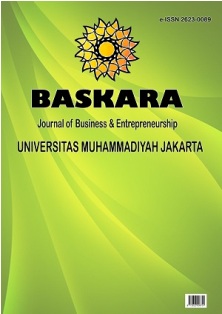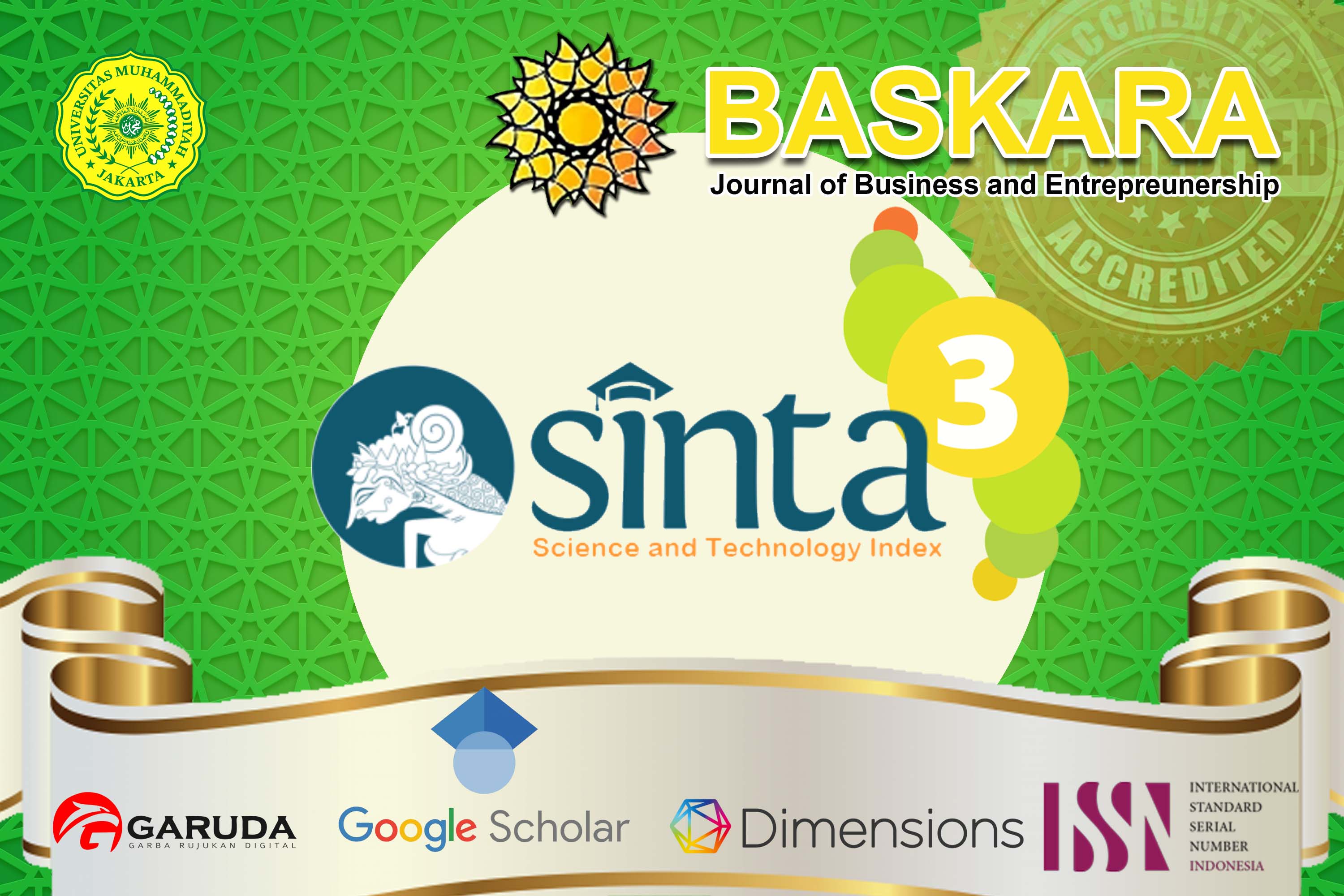Pengembangan Usaha Permen Susu Sapi Dengan Penambahan Ekstrak Kopi (Studi Kasus Pada Kelompok Tani Ternak Andini di Kecamatan Getasan Kabupaten Semarang)
DOI:
https://doi.org/10.54268/baskara.v1i2.5935Keywords:
permen susu kopi, Break Even Point, Pengembangan usahaAbstract
Penelitian ini bertujuan untuk menganalisis Break Event Point usaha permen susukopi dan pengembangan usaha permen susu kopi di Kelompok Tani Ternak Andini Kecamatan Getasan Kabupaten Semarang. Penelitian dilaksanakan pada bulan Mei sampai bulan Juli 2019. Metode yang digunakan analisis deskriptif kualitatif, pengambilan data dengan wawancara dan observasi. Pengambilan sampel dilakukan dengan metode Proportional Area Random Sampling, diperoleh 92 peternak. Hasil penelitian BEP unit usaha permen susu kopi di Getasan Kabupaten Semarang adalah sebesar 44.512 bungkus permen yang diproduksi selama 7 kali. Pengembangan usaha permen susu sangat memungkinkan dikembangkan karena ketersediaan bahan baku susu, ketersediaan tenaga kerja, permen susu memberikan nilai tambah, dan pemasaran permen susu masih sangat memungkinkan.References
Abubakar dan M. Ilyas. 2005. Mutu susu karamel asal susu pecah selama penyimpanan. Seminar Nasional Teknologi Peternakan dan Veteriner 2005.
Afriani. 2011. Karakteristik dadih susu sapi hasil fermentasi beberapa starter bakteri asam laktat yang diisolasi dari dadih asal Kabupaten Kerinci. Agrinak.
Anggara, Sri. 2011. Kopi Si Hitam Menguntungkan : Budi Daya dan Pemasaran. Yogyakarta : Penerbit Cahaya Atma Pustaka
Anggraeni, N.K., 2010. Study Kelayakan Tentang Perencanaan Usaha Permen Karamel (Hoppies kombinasi) Perpustakaan Universitas Negeri Semarang.
Arikunto, S. 2012. Prosedur Penelitian : Suatu Pendekatan Praktik. Rineka Cipta: Jakarta.
Badan Pusat Statistik. 2017. Kabupaten Semarang dalam Angka. Badan Pusat Statistik. Semarang.
Budiyanto, A. 2002. Dasar-Dasar Gizi. Jakarta : Gramedia.
Departemen Kesehatan Republik Indonesia. 2005. Daftar Komposisi Bahan Makanan. Jakarta: Depkes RI.
Dinas Peternakan dan Keswan Jateng, 2018. Jawa Tengah dalam Angka. Dinas Peternakan dan Kesehatan Hewan, Semarang.
Farah, Adriana. 2012. Coffee :Emerging Health Effects and Disease Prevention, First Edition. John Willey & Sons, Inc and Institute of Food Technologists (USA) : Wiley Blackwell Publising.
Hakim, Meike Sketsa. 2000. Karakteristik Karamel Susu dengan Penambahan Kacang Kedelai (Glycine max (L.) Merrill). Skripsi. Fakultas Peternakan IPB, Bogor.
¬¬Mulato. 2013. Pelarutan Kafein Biji Kopi Robusta dengan Kolom Tetap Menggunakan Pelarut Air. Pelita Perkebunan.
Nitisemito, A.S. dan Burhan, M.U. 2004. Wawasan Study Kelayakan Dan Evaluasi Proyek. Bumi Aksara: Jakarta.
Schiffman, L. and Kanuk, L.L. 2010. Consumer Behavior. 10th Edition. Pearson Prentice Hall: New Jersey.
Siva, Saramoya. 2015. Eksperimen Pembuatan Permen Karamel Susu. Universitas Negeri Semarang : Semarang.
Sugiyono, 2013. Metode Penelitian dan Pendidikan (Pendidikan Kuantitatif, Kualitatif dan R&D). Alfabeta: Bandung.
Soekartawi. 2011. Ilmu Usaha Tani. Universitas Indonesia : Jakarta
Susilorini, Tri Eko dan Sawitri, Manik Eirry. 2006. Produk Olahan Susu. Jakarta: Penebar Swadaya.
Widayani. W., 2004. Analisa Strategi Pemasaran Industri Kecil Permen Karamel Susu Di Daerah Pengalengan, Jawa barat. Bogor : Institut Pertanian Bogor.
Downloads
Published
Issue
Section
License
In order for Baskara: Journal of Business and Entrepreneurship to publish and disseminate research articles, we need publishing rights (transfered from author(s) to publisher). This is determined by a publishing agreement between the Author(s) and Baskara Journal. This agreement deals with the transfer or license of the copyright of publishing to Baskara: Journal of Business and Entrepreneurship, while Authors still retain significant rights to use and share their own published articles. Baskara : Journal of Business and Entrepreneurship supports the need for authors to share, disseminate and maximize the impact of their research and these rights, in any databases.
As a journal Author, you have rights for a large range of uses of your article, including use by your employing institute or company. These Author rights can be exercised without the need to obtain specific permission. Authors publishing in Baskara : Journal of Business and Entrepreneurship have wide rights to use their works for teaching and scholarly purposes without needing to seek permission, including:
- use for classroom teaching by Author or Author's institution and presentation at a meeting or conference and distributing copies to attendees;
- use for internal training by author's company;
- distribution to colleagues for their reseearch use;
- use in a subsequent compilation of the author's works;
- inclusion in a thesis or dissertation;
- reuse of portions or extracts from the article in other works (with full acknowledgement of final article);
- preparation of derivative works (other than commercial purposes) (with full acknowledgement of final article);
- voluntary posting on open web sites operated by author or author’s institution for scholarly purposes.
Copyright Transfer Agreement for Publishing (Publishing Right)
The Authors who submit manuscript has to understand that if accepted for publication, mean that all copyright and publishing right of the article shall be assigned/transferred to Baskara: Journal of Business and Entrepreneurship as assigned publisher.
- CC BY-NC: This license allows reusers to distribute, remix, adapt, and build upon the material in any medium or format for noncommercial purposes only, and only so long as attribution is given to the creator.
It includes the following elements:
BY ![]() – Credit must be given to the creator
– Credit must be given to the creator
NC ![]() – Only noncommercial uses of the work are permitted
– Only noncommercial uses of the work are permitted
Baskara (C) Copyright (2022):
BASKARA: Journal of Business and Entrepreneurship by https://jurnal.umj.ac.id/index.php/baskara
is licensed under a Creative Commons Attribution-NonCommercial 4.0 International License








